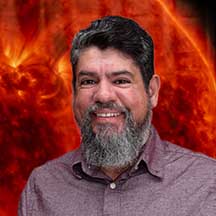Perspectives on thermosphere mass density modeling during extreme magnetic storms: A look to the future with an eye in the past
Denny Oliveira
Research Scientist
Heliophysics Division
NASA Goddard Space Flight CenterSpace
Sciences Laboratory
Wed, April 10, 2024 - 4:00 PM
 Satellites, crewed spacecraft and stations in low-Earth orbit (LEO) are very sensitive to atmospheric drag. A satellite’s lifetime and orbital tracking become increasingly inaccurate during magnetic storms, particularly during extreme events. Given the planned increase of government and private satellite presence in LEO, the need for accurate density predictions for collision avoidance and lifetime optimization, particularly during extreme events, has become an urgent matter. Additionally, long-term solar activity models and historical data suggest that the solar activity will significantly increase in the following years and decades. We then briefly summarize the main achievements in the research of thermospheric density response to magnetic storms occurring particularly after the launching of many satellites with state-of-the-art accelerometers from which high-accuracy densities can be determined. We will show that the performance of an empirical model with data assimilation is higher than its standalone performance during all storm phases. We will then discuss how forecasting models can be improved by looking into two directions: first, to the past, by adapting historical extreme storm datasets for density predictions, and second, to the future, by facilitating the assimilation of large-scale data sets that will be collected in future events. Results concerning the Starlink satellite debacle in February 2022 will also be presented.
Satellites, crewed spacecraft and stations in low-Earth orbit (LEO) are very sensitive to atmospheric drag. A satellite’s lifetime and orbital tracking become increasingly inaccurate during magnetic storms, particularly during extreme events. Given the planned increase of government and private satellite presence in LEO, the need for accurate density predictions for collision avoidance and lifetime optimization, particularly during extreme events, has become an urgent matter. Additionally, long-term solar activity models and historical data suggest that the solar activity will significantly increase in the following years and decades. We then briefly summarize the main achievements in the research of thermospheric density response to magnetic storms occurring particularly after the launching of many satellites with state-of-the-art accelerometers from which high-accuracy densities can be determined. We will show that the performance of an empirical model with data assimilation is higher than its standalone performance during all storm phases. We will then discuss how forecasting models can be improved by looking into two directions: first, to the past, by adapting historical extreme storm datasets for density predictions, and second, to the future, by facilitating the assimilation of large-scale data sets that will be collected in future events. Results concerning the Starlink satellite debacle in February 2022 will also be presented.
Refreshments served at 3:45 PM
If you have any questions about the Colloquium Series or would like to make a donation please contact the Physics Department, cua-physics@cua.edu or (202) 319-5315.
